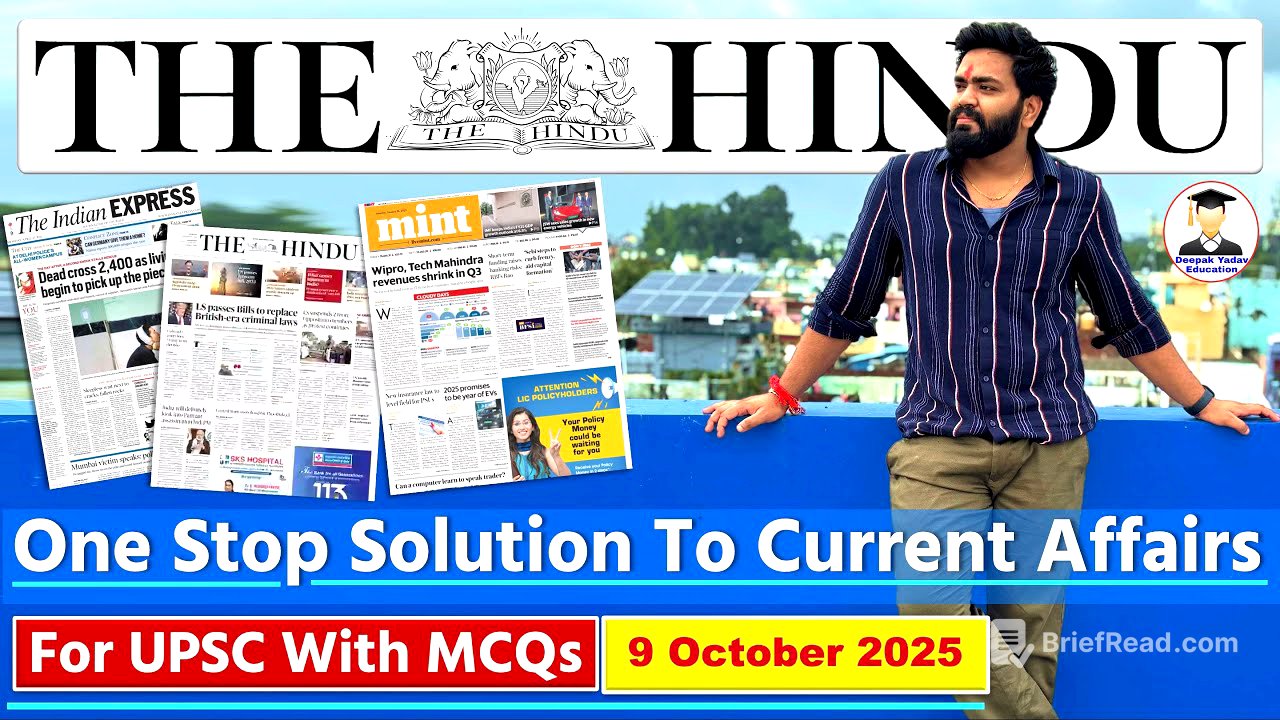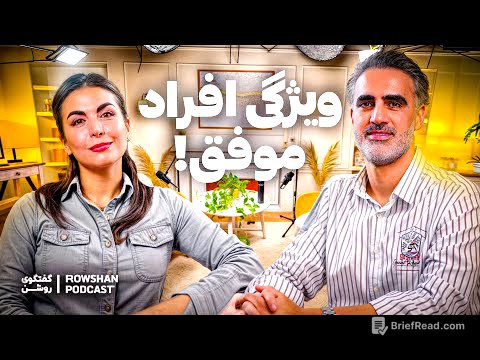TLDR;
This YouTube video by Deepak Yadav Education provides a comprehensive analysis of The Hindu newspaper, dated October 9, 2025. It covers key articles related to international relations, economics, and science, including discussions on the UK Prime Minister's visit to India, the Nobel Prize in Chemistry, and India's initiatives to promote solar pump schemes in Africa. The video also addresses the issue of water hyacinth as an invasive species and its impact on the environment.
- UK-India Trade Relations
- Nobel Prize in Chemistry
- Solar Pump Schemes in Africa
- Invasive Species: Water Hyacinth
Introduction [0:00]
The video introduces the daily analysis of The Hindu newspaper, dated October 9, 2025, and encourages viewers to download the PDF of the lecture from the Deepak Yadav Education Telegram channel. It also poses a map question about the location of Madagascar for viewers to answer in the comments.
UK Prime Minister's Visit to India [0:46]
The UK Prime Minister, Keir Starmer, is visiting India with a delegation of 125 people, including entrepreneurs and university chancellors, to discuss a Comprehensive Economic and Trade Agreement. The goal is to increase annual trade between India and the UK to $25 billion. This visit aims to strengthen the Comprehensive Strategic Partnership between the two countries, building on the Comprehensive Economic Trade Agreement (SETA) signed in July 2025.
Free Trade Agreements Explained [3:58]
The discussion explains free trade agreements, including SEPA and SETA, which aim to reduce trade barriers between countries. By eliminating import taxes and tariffs, these agreements can boost exports and imports, benefiting both participating countries. The UK is seeking to increase trade and investment with countries like India following its exit from the European Union (Brexit).
Vision 2035 and Benefits of the UK-India Deal [7:58]
The meeting between PM Modi and the UK delegation focuses on Vision 2035, a 10-year roadmap for collaboration in sectors like trade, investment, technology, defense, climate, health, and education. The deal is expected to open the European market for India, boost Indian exports, and maintain the UK's supply chain. Rolls-Royce plans to make India a major hub for manufacturing and innovation.
Cultural Diplomacy and Significance of the Visit [10:53]
The UK Prime Minister's visit includes cultural diplomacy, such as visiting Yash Raj Film Studio and announcing plans for Bollywood movies to be filmed in the UK. This visit is considered a significant deal for the UK post-Brexit, with the UK viewing India as a major global economy.
Free Trade Agreement Questions and Examples [12:49]
The discussion includes sample questions related to free trade agreements, similar to those asked in UPSC and CDS exams. It highlights factors influencing a country's exports when entering a free trade agreement, such as reduced tariffs, easier export rules, relaxed food and beverage regulations, better infrastructure, and a strong economic condition in the partner country.
Nobel Prize in Chemistry 2025 [17:41]
The Nobel Prize in Chemistry for 2025 has been awarded to three individuals: Omar M. Yaghi, Richard Robson, and Susumu Kitagawa, for their work on Metal-Organic Frameworks (MOFs). MOFs are crystalline materials made by combining metal ions and organic molecules, creating porous 3D networks.
Metal-Organic Frameworks (MOFs) Explained [18:29]
MOFs are crystalline materials composed of metal ions and organic molecules, forming a 3D network with pores. They are lightweight, flexible, and capable of absorbing and trapping gases. Richard Robson initiated the idea, followed by Kitagawa developing flexible MOFs, and Yaghi creating stable MOFs capable of storing water, hydrogen, and carbon.
Applications of MOFs [25:08]
MOFs have various applications, including carbon absorption for climate change mitigation, water extraction from desert air, pollution control, energy storage (hydrogen), and targeted medicine delivery. They also function as chemical sensors in industries. MOFs are different from zeolites, which use inorganic compounds instead of organic molecules.
Nobel Prize in Chemistry Question and Review [28:25]
A sample question about MOFs is presented, testing understanding of their composition and properties. The discussion revisits previous Nobel Prizes in Medicine and Physics, emphasizing the importance of regulatory T cells and quantum tunneling.
India to Boost Solar Pump Schemes in Africa and Island Nations [30:51]
India plans to expand solar pump schemes in Africa and island nations, promoting the International Solar Alliance. This initiative aims to replace diesel pumps with solar-powered pumps for irrigation, reducing pollution and providing farmers with additional income by selling excess electricity generated from solar panels.
PM Kusum Scheme Details [34:38]
The PM Kusum Scheme, launched in 2019 under the Ministry of New and Renewable Energy, aims to install solar panels in fields and replace diesel pumps. It includes components for decentralized grid-connected renewables, solar pump installation, and grid-connected agricultural land. The government has allocated ₹34,000 crore for the scheme, providing subsidies to farmers.
PM Surya Ghar Yojana and Financial Aspects [37:39]
The PM Surya Ghar Yojana encourages rooftop solar panel installation with government subsidies. For example, a 4-kilowatt solar panel system costs approximately ₹2.5 lakh, with a subsidy of ₹18,000 available in Uttar Pradesh. The goal is to achieve 348 gigawatts of energy by 2026.
India's Plan for Africa and African Nations Importance [40:04]
India aims to implement its solar panel initiatives in Africa to address electricity connectivity issues and reduce reliance on diesel. African nations are important due to their rich mineral resources and business opportunities.
PM Kusum and Surya Ghar Questions and Objectives [41:43]
Sample questions from BPSC and UPSC exams are discussed, focusing on the objectives of the PM Kusum and PM Surya Ghar schemes. The main objective of PM Kusum is to reduce farmers' dependence on diesel and kerosene, while PM Surya Ghar aims to install solar rooftop panels in 1 crore residential units.
Water Hyacinth: An Invasive Species [44:52]
Water hyacinth is identified as an invasive species in India, causing a huge crisis. Originally brought to India by the British for decoration, it has spread rapidly, occupying over 2 lakh hectares of water bodies.
Problems Caused by Water Hyacinth [47:30]
Water hyacinth blocks sunlight and oxygen, harming aquatic ecosystems. It is a major problem in Kerala, affecting Vamanad Lake and Kudanad. In Kenya, it has caused losses in Lake Naivasha. The scientific name of water hyacinth is Eichhornia crassipes.
Harmful Effects on Farmers, Fishermen, and the Environment [51:32]
Water hyacinth harms farmers by blocking irrigation channels, fishermen by damaging nets and hindering boat movement, and the environment by destroying aquatic ecosystems and releasing harmful gases like methane. It also negatively impacts tourism.
Solutions and Way Forward [53:25]
Solutions include using water hyacinth for handicraft work, paper production, and biogas. A national-level policy with single-point accountability is needed, along with scientific removal methods and innovation. Creating awareness and generating employment through water hyacinth treatment are also important.
Water Hyacinth Questions and Previous Year Examples [55:29]
Sample questions about water hyacinth are discussed, including its introduction to India and its impact on native plants. A previous year's UPSC question about Prosopis juliflora is used as an example of how similar questions can be framed.









